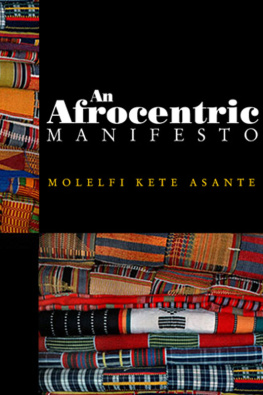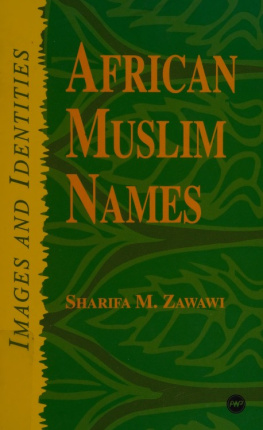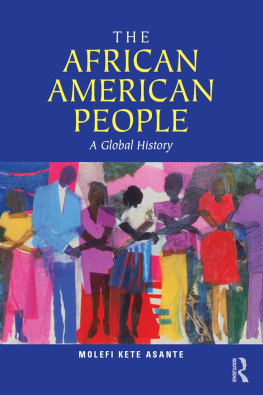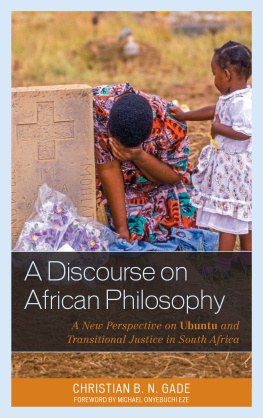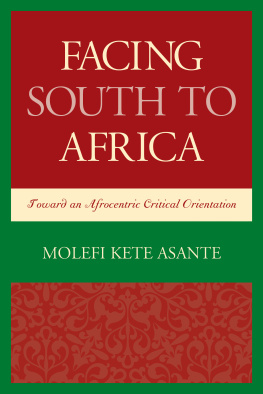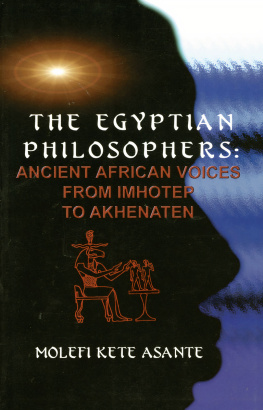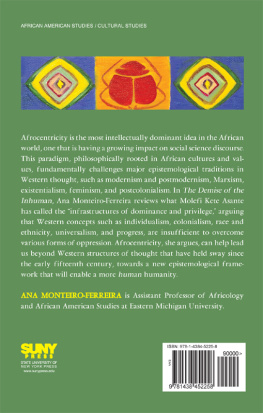An Afrocentric Manifesto
An Afrocentric Manifesto
Toward an African Renaissance
MOLEFI KETE ASANTE
polity
Copyright Mole Kete Asante 2007
The right of Mole Kete Asante to be identied as Author of this Work has been asserted in accordance with the UK Copyright, Designs and Patents Act 1988.
First published in 2007 by Polity Press
Polity Press
65 Bridge Street
Cambridge CB2 1UR, UK
Polity Press
350 Main Street
Malden, MA 02148, USA
All rights reserved. Except for the quotation of short passages for the purpose of criticism and review, no part of this publication may be reproduced, stored in a retrieval system, or transmitted, in any form or by any means, electronic, mechanical, photocopying, recording or otherwise, without the prior permission of the publisher.
ISBN-13: 978-0-7456-5498-0
A catalogue record for this book is available from the British Library
Typeset in 11.25/13 pt Dante
by Servis Filmsetting Ltd, Manchester
Printed and bound in Great Britain by MPG Books Ltd, Bodmin, Cornwall
The publisher has used its best endeavours to ensure that the URLs for external websites referred to in this book are correct and active at the time of going to press.However, the publisher has no responsibility for the websites and can make no guarantee that a site will remain live or that the content is or will remain appropriate.
Every effort has been made to trace all copyright holders, but if any have been inadvertently overlooked the publishers will be pleased to include any necessary credits in any subsequent reprint or edition.
For further information on Polity, visit our website www.polity.co.uk
Contents
Introduction
An overview
The African people of Georgia tell the story of a mother eagle that was ying low over a chicken yard holding her newly born baby eagle in her claws as she joined a large ock of eagles. A gust of wind forced the young eagle out of the mothers claws and it fell into the chicken yard. Although she looked for the baby eagle she could not nd it. All she could see when she looked into the chicken yard were chickens. So after a long and exhaustive search, she reluctantly left the baby eagle and ew away with the large ock of eagles.
As the baby eagle grew in the chicken yard, it began to see itself as a chicken. Surrounded as it was by chickens, the little eagle received a chicken education, wore chicken clothes, ate chicken food, and attempted to imitate the walk and mannerisms of the chickens. Every day the little eagle practiced its chicken education. Its curriculum was a strictly chicken curriculum, one made expressly for chickens, to assist chickens in living in the chicken yard as good chickens. When the little eagle spoke, it spoke chicken language because it did not know eagle language. It carried its head like the chickens because it had only a faint knowledge, elementary knowledge, of what an eagle style or fashion or idea might have been. All traces of its earlier eagle training had been forgotten. In everything, the little eagle acted like a chicken until one day it started to think of itself as a chicken.
It tried to mimic the chickens. Whatever the chickens did, it did. If the chickens laughed, it laughed. If the chickens said, It is a good day outside, the eagle said, It is a good day outside. In everything that mattered the eagle saw itself as a chicken. It did not recognize itself as an eagle. In fact, all eagle consciousness was lost. Although it questioned why it looked different from the rest of the chickens, it just thought it was a funny-looking chicken. Soon it never thought of itself as anything but a chicken, strange-looking and all. There were physical characteristics it did not like because they were not the characteristics appreciated by the chickens. It never saw itself in the light of its eagle history; it was simply a chicken.
One sunny day an old eagle ew over the chicken yard. It had no special mission and was not looking for anything in particular. However, as it was leisurely ying over the chicken yard, something caught its attention. It looked down and saw what it thought was an eagle. It ew closer and looked with keener sight and saw what it was sure was an eagle. It then ew to a tree just next to the chicken yard and it called out to the bird that looked like an eagle. Come up here and talk with me, young eagle, the old eagle said. The eagle in the chicken yard ignored the old eagle because it knew it was not the eagle that was being called because it was a chicken. But the old eagle persisted and at last the eagle in the chicken yard recognized that he was being called. Whereupon the eagle in the yard turned and said to the old eagle, Im not an eagle, Im a chicken. The old eagle, with knowledge that stretched back through generations of eagles, said I know an eagle when I see one. Youre an eagle. Open your wings and y up here to this tree and let us talk. The young eagle in the chicken yard said, I cannot y because I am a chicken. After the old eagle had asked it several times, the young eagle stretched its wings and apped them and ew up to the tree. It looked down at the chicken yard and said, I did not know that I could do that. The old eagle asked the young eagle to y and they ew effortlessly toward the setting sun.
Pinpointing the issue
I am a child of seven generations of Africans who have lived in America. My entire life, including career, struggle against oppression, search for ways to overturn hegemony, political outlook, fortunes and misfortunes, friends and detractors, has been impacted by my Africanness. It is an essential reality of an African living in America. Sometimes one has to learn what it is to be and this learning is how something seemingly essential can be translated into culture.
Afrocentricity is a paradigmatic intellectual perspective that privileges African agency within the context of African history and culture transcontinentally and trans-generationally. This means that the quality of location is essential to any analysis that involves African culture and behavior whether literary or economic, whether political or cultural. In this regard it is the crystallization of a critical perspective on facts (Asante, 1998). I do not present Afrocentricity as a settled corpus of ideas, as a worldview or as a closed system of beliefs. It remains important that we hold back any reductive misunderstanding of the nature of human interaction and the creation of reality. The vast academic corporate grab for uniformity, rooted in the tradition of the assertive American reach for hegemony in thought, leads to the inevitable confrontation between Afrocentrists and those who would like to subsume all new ideas under one form or the other of Eurocentrism (Keita, 2000). What is now plain to see is that some scholars are nervous about the possibility of a perspective on data, that is, a locative thesis, which does not adapt to the overarching ideas of a European hegemony. At this moment in intellectual history there is a critical reading and an assessment of Afrocentricity in all disciplines. Every one has something to say and normally what they have to say is critical of the fact that Afrocentricity appears outside the mainstream. What is meant by this notion of being outside is that Afrocentricity traces its theoretical heritage to African ideas and African authors. It is not a Eurocentric idea because, for it to be, it would mean that Europe would be assaulting its own patriarchy and sense of superiority in language, content, and structure. Clarence Walker, a leading Eurocentrist, who happens to be black in color, writes in his book, We Cant Go Home Again (Walker, 2001, p. xviii), something quite naive and nonsensical when he says: Although some of its advocates may claim that Afrocentrism is history, the methods by which its proponents reach their conclusions are not historically rigorous. The navet occurs because Walker knows no Afrocentrist who claims that Afrocentricity is history. What is nonsensical about this charge is that any conclusion reached by Afrocentrists is usually based on the best arguments in the literature or orature. Clearly what would have been useful here is for Walker to cite some reference, some argument made by Afrocentrists, which suggested the lack of rigor. I accept the fact that he could not produce such an argument and therefore resorted to the most incredible example of the lack of rigor: the assertion without proof.
Next page
